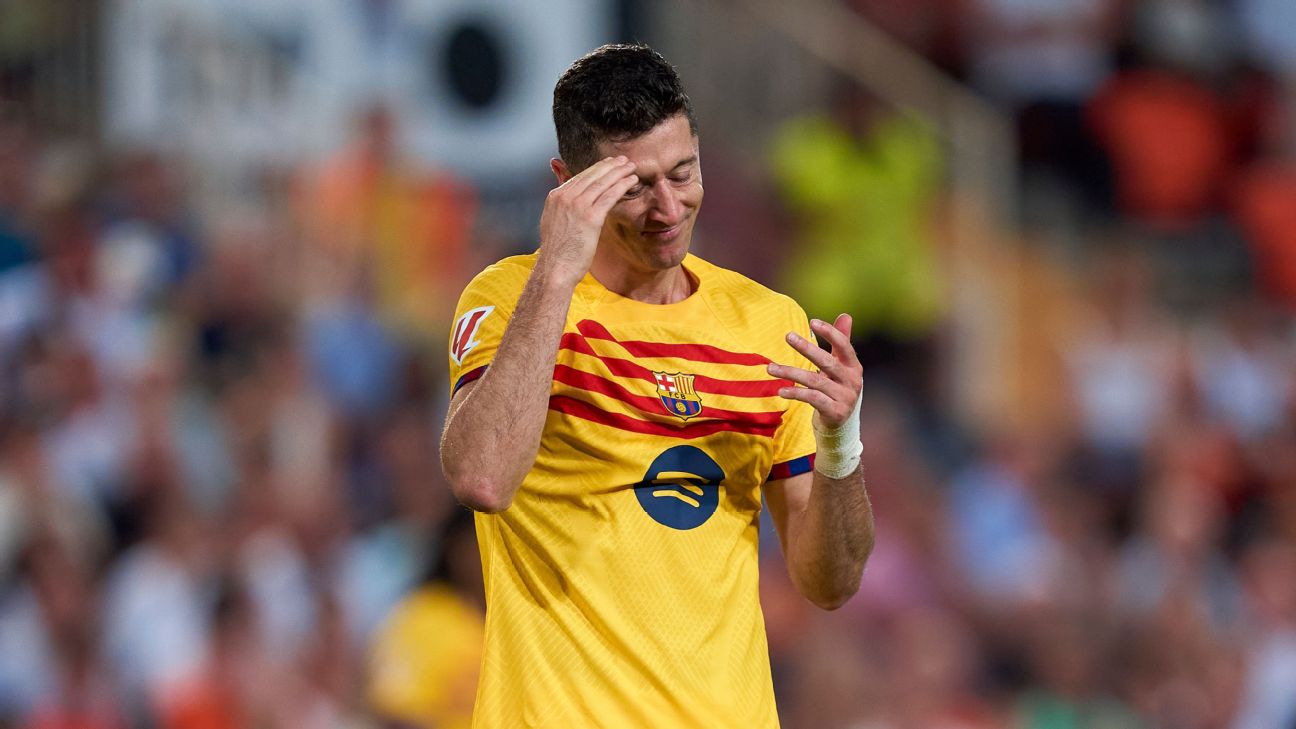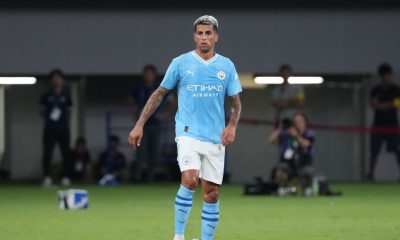First off, a happy birthday to Robert Lewandowski: he turns 36 years old this midweek. It signals the arrival of a time-honoured dilemma for FC Barcelona: What do you get the man who has everything?
The top choice, I’d say, if there are any on the market, would be a time machine. Not to fly forward and discover the mysteries of the future, nor to go back centuries and bring back tales of crusading Lewandowskis and their adventures in the 15th century. Just a wee time machine that could strip five or six years off the big Poland international striker because, frankly, he’s showing his age. He’s now in decline.
Yes, yes, I know: it was thanks to his brace of goals that Barcelona finished the first round of matches on top of LaLiga with a groovy little 2-1 win at Valencia‘s Mestalla under their belts. And yes, I know that as recently as March, I wrote positively about “Lewa” because of two games (wins over Napoli and Atletico Madrid) in which he prioritised team play, set up goals for Fermín López and looked like he’d undergone a mental “reset.”
But here’s the rub.
Lewandowski, irrespective of his goals, stank the house out on Saturday night in Valencia. That in itself wouldn’t be the end of the world after one single match; what is worrying, however, is how repetitive this trend is.
Barcelona’s most expensively salaried player — widely reported to be earning €30m pre-tax this season — keeps contributing very little other than goals (I know that sounds a provocative description but back to that in a minute), then says that he’s been suffering a physical crisis, following that up by saying that he’s learned from it and that the future’s going to be rosy and lovely.
In my last Lewandowski column, I detailed how forensically critical I’d been of his performances in his first season at Barcelona and how, not long after, he’d gone on record in Poland to admit precisely the flaws I’d highlighted. This summer, speaking to Sebastian Salazar, he reflected on his second season at Barcelona (in 2023/24) and said: “I feel better than last year for sure physically. The last year was physically more difficult. I know what I did wrong what I could do better or what I missed. Physically I don’t see the difference between now and three years ago.”
I do, Robert. I do.
He pointed to needing to exercise more, and better. That last season, he’d been 10-20% short of where he should have been, and said: “The head started working less, then your body, then your decisions and self-confidence. Everything goes in one way … but the bad way!” We might be only one match into the new LaLiga season, but the evidence to support this summer’s self-assessment was very shabby indeed.
To be fair, a goal’s a goal. It counts equally whether you’ve filled the net after beating three opponents and put the ball into the top corner from 25 yards, or shunted it in from less than a metre out after a brilliant Lamine Yamal volley across the goalmouth. The latter is how Lewandowski got off the mark: we give 95% of the credit to the 17-year-old, and 5% to the veteran forward.
Ditto the penalty. People sneer at penalties being counted in scorers’ stats, but that’s outright wrong: they are a science, they need to be converted and this, in Valencia, was one of the Pole’s better efforts.
No argument there, but there’s a word in Spanish football for those who analyse a match and a team’s performance based solely on the scoreline rather than what actually happened: “resultadista.” It’s a match analysis that you could compare to a house built on faulty foundations — like the modern (and somewhat infantile) tendency to award Man of the Match prizes to whoever has scored a key goal, irrespective of how he or she performed the rest of the match and irrespective of whether any number of other participants were actually dominant and crucial to the pattern and the result.
In a way, it’s a bit like the fable of the Emperor’s New Clothes, where everyone’s too scared to say that the powerful man isn’t wearing a thing. So, here goes.
Throughout the match, Lewandowski was somnolent: sluggish when offered possession, cumbersome athletically, lacking any deftness of technical touch, and not really of any material use to the team in aspects outside those two goals. Each of which 99% of footballers would have scored.
If you watched the game, then simply relying on the naked eye would have left you with this clear impression. But the stats, in this instance, actually help make sense of it too.
Barcelona made 561 passes and had the ball for 63% of the match. Yet by half-time, Lewandowski had touched the ball nine times (!!), adding a measly 15 more contacts with play in the second half. He won the ball back precisely zero times and passed it 17 times, a third of which were backward and not one of which was forward.
This type of analysis benefits from context and comparison. So, for example, in an away match (at Mallorca) where Madrid had 63% possession and made 650 passes (broadly similar to Barcelona), Kylian Mbappé was on the ball 42 times, Vinícius 56 times and Rodrygo a whopping 79 times. They worked harder, they dropped into better positions, wanted the ball in nonscoring positions more often: despite only earning a 1-1 draw, the trio hugely outperformed Lewandowski in terms of effort, availability and flow of play.
Even though Mallorca passed the ball accurately only 273 times and had less than 37% possession, Vedat Muriqi (their scorer against the Spanish and European champions) was on the ball more than Lewandowski managed to be.
One final bit of context, in case people think I’m being ageist, comes from Iago Aspas. A mercurial magician he may be, but unlike Lewandowski (29 trophies), the Galician has no major honours to his name, has played for Spain only 20 times and is already 37. During Celta’s 2-1 victory over Alaves, where Aspas got the late winner, and where Celta had less possession and fewer passes than Barcelona did later that night, the 37-year-old was involved with play 39 times — significantly more than Lewandowski.
In the final third of last season, Xavi began to substitute Lewandowski off sometime after an hour or so had been played and, frankly, Barcelona’s football was sharper and athletically better as a result.
Lewandowski and current manager Flick share an agent, and it’s up to you whether or not you share my suspicion that Xavi’s decision to start treating Lewandowski based on his performance, rather than his salary and status, in any way helped influence President Laporta in the decisions he subsequently made. After all, it wouldn’t be the first time an “immovable” and unhappy “star” player managed to rumble enough about unhappiness that changes followed.
During the second cooling/hydration break at Mestalla, it was interesting that Flick, still not fluent in Spanish, chose to communicate some of his wishes via Lewandowski, with whom he shares a language (German) and a mutual past at Bayern. The Pole’s usefulness to Flick is greater than just the goals he does or doesn’t score.
It’s a situation worth watching, with clear eyes rather than “resultadista” doe-eyed fawning, when the 36-year-old scores.
Flick and Barcelona have notable talent soon returning to their team (Pedri, Gavi, De Jong, Araujo, Fermin) and match fitness to add throughout the squad. The team, and Lewandowski, might easily improve on what we saw during the U.S. preseason tour (where Lewandowski fluffed a goal-line “sitter” against Madrid) and in Valencia.
When the match finished on Saturday, Barcelona’s No. 9 admitted to my colleague Carlos Ponte that he had a secret birthday wish but said he wouldn’t reveal it in case it didn’t then come true. Eventually, he added: “Maybe after this season I can tell you what kind of wish it was!”
If not a time machine, then surely it was a wish for quicker reflexes, better first touch, movement that gives him more quality time on the ball and performances in line with his superstar salary. Not too much to ask, right?
Cumpleaños feliz, Robert.













